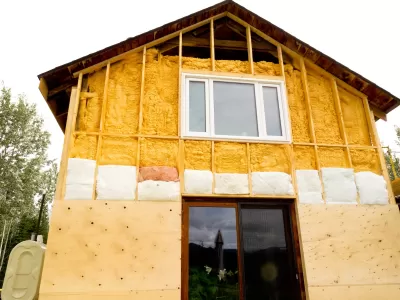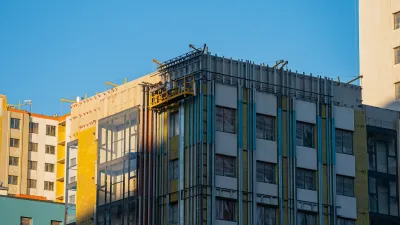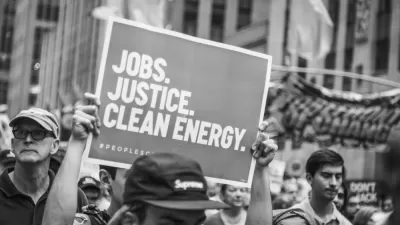The program requires that 40 percent of some federal funds be used to benefit historically disadvantaged communities.

In an article for Blavity, Jeanne Yacoubou outlines how the Biden administration’s Justice40 Initiative, which mandates that 40 percent of certain federal investments go to disadvantaged communities, has affected affordable housing and equity since its creation in 2021.
The program defines ‘disadvantaged’ communities as “those that are marginalized, underserved, and overburdened by pollution while underinvested in housing, transportation, water and wastewater infrastructure, and health care,” Yacoubou explains.
The Green and Resilient Retrofit Program has, so far, installed energy efficiency upgrades in roughly 2,000 multifamily homes occupied by low-income households.
As Yacoubou notes, “The future of the remaining Justice40 funds depends on the results of the 2024 presidential election. Donald Trump has vowed to eliminate all or most of the remaining funds of the IRA climate law calling it a ‘waste’ of money.” Meanwhile, 16 Republican governors want to keep the benefits of the Infrastructure Investment and Jobs Act (IIJA), but called on President Biden to eliminate the environmental justice requirements.
FULL STORY: The Justice40 Initiative And Affordable, Sustainable Housing

Study: Maui’s Plan to Convert Vacation Rentals to Long-Term Housing Could Cause Nearly $1 Billion Economic Loss
The plan would reduce visitor accommodation by 25,% resulting in 1,900 jobs lost.

North Texas Transit Leaders Tout Benefits of TOD for Growing Region
At a summit focused on transit-oriented development, policymakers discussed how North Texas’ expanded light rail system can serve as a tool for economic growth.

Using Old Oil and Gas Wells for Green Energy Storage
Penn State researchers have found that repurposing abandoned oil and gas wells for geothermal-assisted compressed-air energy storage can boost efficiency, reduce environmental risks, and support clean energy and job transitions.

Private Donations Propel Early Restoration of Palisades Playground
Los Angeles has secured over $1.3 million in private funding to restore the Pacific Palisades playground months ahead of schedule, creating a modern, accessible space that supports community healing after recent wildfires.

From Blight to Benefit: Early Results From California’s Equitable Cleanup Program
The Equitable Community Revitalization Grant (ECRG) program is reshaping brownfield redevelopment by prioritizing projects in low-income and environmental justice communities, emphasizing equity, transparency, and community benefits.

Planting Relief: Tackling Las Vegas Heat One Tree at a Time
Nevada Plants, a Las Vegas-based nonprofit, is combating the city’s extreme urban heat by giving away trees to residents in underserved neighborhoods, promoting shade, sustainability, and community health.
Urban Design for Planners 1: Software Tools
This six-course series explores essential urban design concepts using open source software and equips planners with the tools they need to participate fully in the urban design process.
Planning for Universal Design
Learn the tools for implementing Universal Design in planning regulations.
Ascent Environmental
Borough of Carlisle
Institute for Housing and Urban Development Studies (IHS)
City of Grandview
Harvard GSD Executive Education
Toledo-Lucas County Plan Commissions
Salt Lake City
NYU Wagner Graduate School of Public Service





























